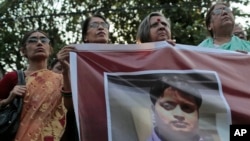In Bangladesh, friends and supporters of three outspoken bloggers, who were killed between February and May, say they are not satisfied with the pace of the police investigation in the cases.
Human rights groups say fatal attacks on the bloggers and freethinkers will not stop in Bangladesh until the government sends out a clear signal to the perpetrators that they will not escape punishment.
“The government is covering up the killings of the bloggers, rather than bringing the murderers to justice. The inaction by the authorities is paving way for more attacks on the bloggers,” said Imran H. Sarker, who leads the Blogger and Online Activist Network in Bangladesh.
Earlier this month, a masked gang, wielding cleavers and machetes, hacked atheist blogger Ananta Bijoy Das to death in the northeastern city of Sylhet. None of the gang has been arrested or identified.
In March, Washiqur Rahman, another atheist blogger known for his views critical of Islam, was killed by three Islamists in Dhaka. Two of Rahman’s killers were caught by passersby before they could flee.
In February, Bangladeshi-American blogger and writer Avijit Roy, who founded the popular atheist blog “Mukto-Mona”, (which means Free Mind in Bengali,) and was known for his writings opposing religious fundamentalism, lost his life when he and his wife were targeted in a machete attack in Dhaka.
Three months after the killing of Roy, police are unable to trace his attackers. His father Ajoy Roy, a retired professor, said that he doubts if the killers in the case will ever be brought to justice.
“There were many witnesses around. But I cannot understand why even in three months they have not succeeded to catch any of them,” Roy told VOA. “The process of the investigation in the case has been very slow. It is my concern that like many other cases of murder in Bangladesh, Avijit’s killing will remain unsolved.”
Accusations of inaction
Roy's wife, who was injured in the February 26 attack, later told reporters that some policemen were standing nearby, but did not intervene.
Former chief justice of Bangladesh A B M Khairul Haque said that sort of behavior should result in the resignation of the police chief.
“The police did not even carry Avijit and his wife to the hospital. The policemen who were around were not even asked to explain why they did not act when the couple was attacked,” Haque said.
Following the March 30 killing of Rahman, police arrested two of his alleged attackers. The Islamic school students said their religious teachers had told them that he deserved to be punished because he allegedly abused Islam.
Online activist Sarker said that the investigation in the case of Rahman’s killing has made no progress.
“The two arrested men clearly said that they attacked Rahman on the order or instigation of some other senior people. It’s certain that they provided the details of those masterminds and the third attacker to the police. But none beyond those two attackers- who were caught by the passersby- has been arrested even two months after the murder,” Sarker said.
The inaction has led some to believe the police are sympathetic to the ideology of the attackers, and could be protecting the killers or not pursuing them effectively.
Meenakshi Ganguly, South Asia director of Human Rights Watch says, "The government of Bangladesh has been arresting opposition workers and leaders, blaming them for violent attacks to enforce strikes and blockades. But its response to the targeted killings of the bloggers has been muted. This is unfortunate. The government needs to speak up on its determination to protect free speech."
Additional time sought
Senior police officers say the investigations into the killings of all three bloggers are on track.
“Our colleagues investigating the three cases are indeed working well. To arrest the chief instigator (Mufti Jasimuddin Rahmani) behind the (2013) killing of (blogger) Ahmed Rajib Haider we took 7 months,” Monirul Islam, chief spokesperson of the Detective Branch of police told VOA.
“We need more time to solve this year’s cases of killings of the bloggers," Islam added.
Islam also said that the charge that a section of the police was not keen to act against the bloggers was “just baseless”.
In 2013, some Islamist groups in Bangladesh issued a list of 84 “atheist bloggers”. In the past 2 years nine from the list, including Avijit Roy, Rahman and Das, have been killed.
“Others in that hit-list are receiving frequent death threats even now as we are discussing this issue. Some of these threats come from traceable sources including phone numbers. So, what has the Government done to find out the persons who circulated the list or those who carried out the attacks or those who are issuing the threats?” asked Abbas Faiz, senior south Asia researcher at Amnesty International.
Faiz says the lack of prosecutions is evidence enough that the government is failing to protect citizens against such attacks.




